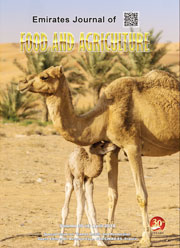Phenolic content and antioxidant activity in Lentinula edodes grown on eucalyptus biomass
DOI:
https://doi.org/10.9755/ejfa.2023.3184Abstract
Objective. To determine whether Lentinula edodes (L edodes) cultured on eucalyptus chips in the Ecuadorian highland generates antioxidant metabolites and anti-inflammatory effects.
Methods. Total phenolic content was determined by the Folin-Ciocalteu reaction, the in vitro antioxidant activity of L edodes extracts was evaluated by the DPPH method and the in vivo anti-inflammatory activity was studied in mice. The chemical composition was studied by phytochemical screening and gas chromatography/mass spectrometry (GC/MS).
Results. Total phenols were higher in extracts with increasingly high-water content. The antioxidant activity was robust and significantly strong in these extracts, suggesting the active metabolites are water-soluble. The anti-inflammation activity was significant in aqueous extracts only. Phytochemical screening indicated an overall similar composition to the literature reported earlier. GC/MS detected galactitol, trehalose, xylitol, phosphoric acid and octadecanoic acid among the most abundant metabolites.
Conclusions. Cultivation on eucalyptus biomass at the Ecuadorian highlands retains the overall chemical composition, the phenolic content, antioxidant levels, and the in vivo anti-inflammatory activity of L edodes. The 11.3% content of trehalose observed is interesting for its capacity to control cellular stress damage.
Key Words: inflammation, antioxidants, phenols, shiitake, Lentinula, phytotherapeutics
Downloads
Published
How to Cite
Issue
Section
Copyright (c) 2023 María E. Jimenez, Helen E. Berrus, Joselyn D. Segarra, Oscar L. Peralta, Mercy P. Pólit, Lisbeth C. Campuzano, Raisa A. Carpio, María P. Fondevila, María C. Villacres

This work is licensed under a Creative Commons Attribution-NonCommercial 4.0 International License.










 .
. 